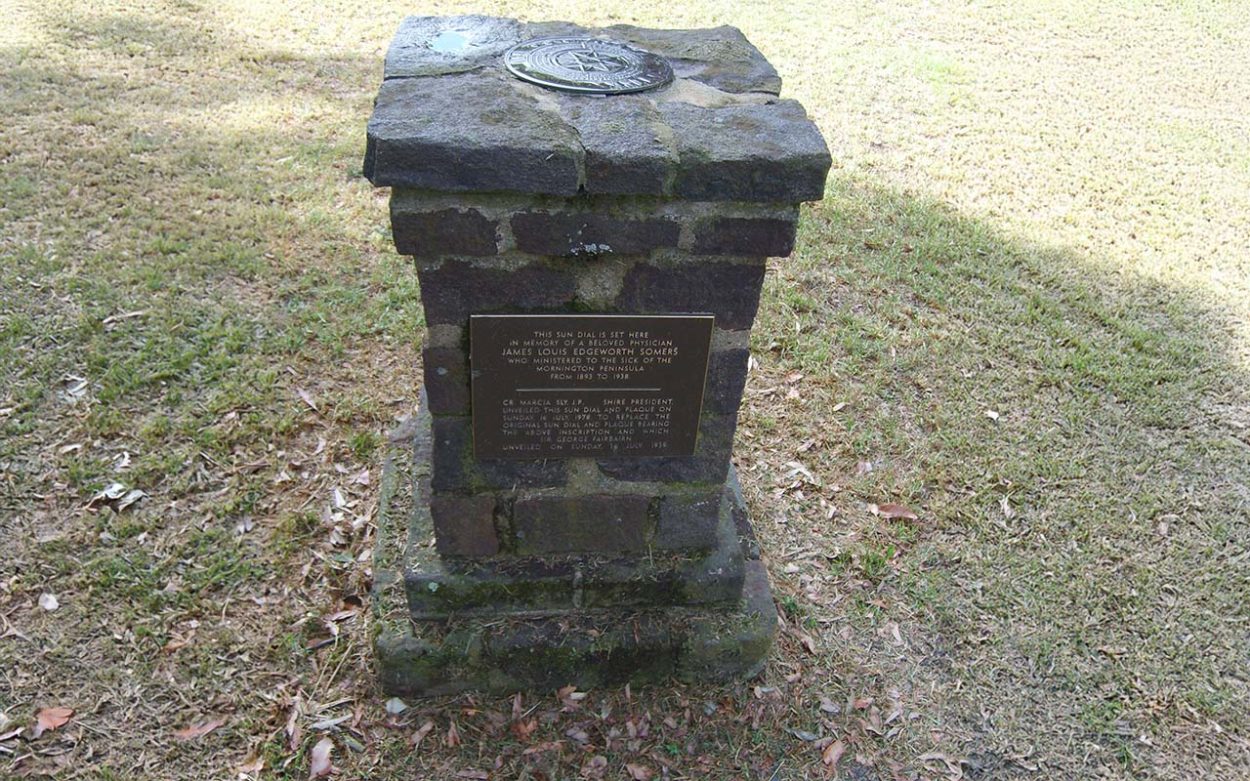Dr James Louis Edgeworth Somers
THE father of the three soldiers was a larger than life character in Mornington and the wider peninsula community for many years.
In The Bush – A story of the Mornington Bush Nursing Hospital by Hilary Abeyaratne, we are given an insight into his contribution:
“Pioneer practitioner” was the term used by The Peninsula Post to describe Dr J L Edgworth Somers when he was, on account of his long and meritorious service in the area, given the honour of addressing the gathering at the opening of the hospital in 1937. In practice on the peninsula since 1892, one of its best known and respected citizens, Dr Somers was still amazingly fit at 75 when he died most suddenly and unexpectedly, “a grand old gentleman and an ornament to the medical profession”.
He was loved as a doctor given to great skill in diagnosis, and also highly respected as the chairman of the local justices. In fact, the day before he died he presided over the cases listed at the local police court for the morning, did one set of his medical rounds soon after, another in the afternoon and again one that night, apparently in perfect health.
He is also remembered for the white horse on which he made his calls (although he later owned both a motorcycle and a car) and for the pack of noisy dogs that accompanied them to herald his arrival.
Dr Somers’s story before coming to Mornington is “most remarkable and romantic”. The son of a doctor in Ireland, he was, at 19, the youngest at that time in the British Empire to obtain his BA (Cantab) before going on for his clinical studies at St Mary’s Hospital, London.
In the years between his graduation and his coming to Mornington at the age of 30, he had had a most adventurous life. He was serving as a surgeon at Fort Juby in West Africa when he was attacked and badly wounded by marauders; he was rescued by a friendly Arab tribe with whom he remained for the next couple of years, living as an Arab.
Later, he lived and practised in South America and Spain before coming to Australia in 1890 where he first toured Queensland on foot before coming to Victoria and Mornington.
He served the town for 45 years, never missing his daily swim at the baths, in winter or summer, until a couple of years before he died in his sleep at his home, Tarfayah, in Albert Street on 17 February 1938.
Shortly after his death the citizens of Mornington erected a cairn and sundial. It was dedicated on 16 July 1939 by Sir George Fairbairn and the inscription reads: “This sundial is set here in memory of a beloved physician, James Louis Edgeworth Somers, who ministered to the sick of the Mornington Peninsula from 1893 to 1938.”
Frances Mabel Edgeworth Somers
Mrs Somers was the daughter of Dr Joseph P Usher of Ballarat and a cousin of Dr Somers. Apart from three boys, the family also included two girls: Florence Ruth Edgeworth Somers and Monica Mary Patricia Edgeworth Somers.
Mrs Somers shared the “intense anxiety” that Dr Somers referred to in one of his letters to the AIF when they were waiting on news of Noel.
On 15 June 1917, The Peninsula Post wrote in its editorial that “The memory of Pte. Somers is kept alive in St Macartan’s Church by two beautiful silver vases, suitably inscribed, presented by Mrs Somers …”.
In a letter to The Post in November, 1917, Mrs Somers said she was to make a presentation to the Shire of Mornington of a memorial board of the fallen of the district, as a “small personal gift”, and expressed the hope that a more enduring marble memorial would be erected after the war to which she would contribute.
On 22 December the memorial board was officially presented by Mrs Somers before “a large assemblage of relatives and friends”.
It was described as “beautifully carved by an English artist (a brother of an Imperial Officer) …” and bearing the names of 20 boys from the district.
It was unveiled with great ceremony by His Excellency Sir John Maddern, Lt Governor, whose stirring speech was reported in The Post on 4 January 1918:
“The noblest feelings of humanity which are theirs, adorned their character and their sacrifice, and so our grief was assuaged in the pride of their heroic deeds.”
Sadly, more grief lay ahead for the Somers family with the death of Gervase toward the end of the war. His name was added to the board, beside that of his brother.
The grief of Mrs Somers was made more tangible by a poem she wrote entitled “My Son” and published in The Post after the war:
Little one with deep blue eyes
Like shadows on the azure skies
Sun kissed curls that seemed to dance
Do you really lie in France?
Son whose eyes ever grew darker blue,
Hair that lost its golden hue,
Eyes which looked with open glance,
Do you really lie in France?
Soldier son who left that day
Kissed me softly seemed so gay
I wonder do you know perchance
My broken heart lies too in France.
Our Boys at the Front: 1914-18 The Mornington Peninsula at war from the pages of the Peninsula Post is an excellent resource for anyone interested in this period of history. It is available through the Mornington and District Historical Society. www.morningtondistricthistory.org.au


